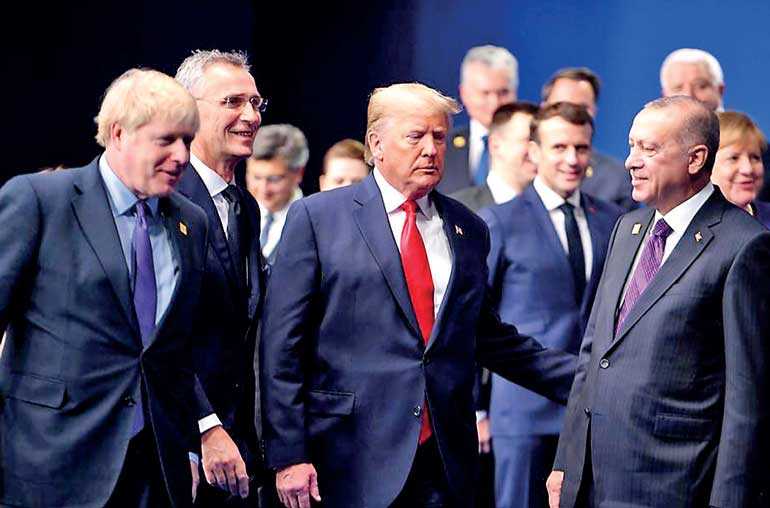Saturday Feb 21, 2026
Saturday Feb 21, 2026
Thursday, 5 December 2019 00:00 - - {{hitsCtrl.values.hits}}

WATFORD, England (Reuters): NATO leaders gathered at a golf resort near London yesterday for a summit acrimonious even by the standards of the Trump era, aiming to tackle sharp disagreements over spending, future threats including China and Turkey’s role in the alliance.
With US President Donald Trump and French President Emmanuel Macron blowing hot and cold over NATO’s function, the 29-member military alliance is looking for reinvigoration as it marks the 70th anniversary of its Cold War-era founding.
“Clearly it is very important that the alliance stays together,” British Prime Minister Boris Johnson told reporters as he prepared to welcome heads of state and government. “But there is far, far more that unites us than divides us.”
Leaders held preliminary meetings in London on Tuesday, during which stark differences were aired, with Trump, who in the past has called NATO obsolete, criticising Macron for comments last month about NATO’s strategic “brain death”.
Trump said Macron’s remarks were “nasty”. He also described allies who spend too little on defence as “delinquent”.
Macron held his ground, saying as he arrived that it was important for leaders to discuss issues in an open and forthright manner if they were to find solutions.
“I think it’s our responsibility to raise differences that could be damaging and have a real strategic debate,” he said. “It has started, so I am satisfied.”
Earlier, in a message on Twitter, Macron was direct about the challenges NATO faces. “It is a burden we share: we can’t put money and pay the cost of our soldier’s lives without being clear on the fundamentals of what NATO should be,” he said.
In an illustration of the awkward mood, Macron, Johnson and the prime ministers of Canada and the Netherlands were caught on video at a Tuesday evening Buckingham Palace reception, apparently making light of Trump’s media appearances.
“It was like a 40-minute press conference,” Canada’s Justin Trudeau can be heard saying, with Queen Elizabeth’s daughter Princess Anne listening on. “I just watched his team’s jaws drop to the floor,” Trudeau added with a chuckle.
One of Macron’s chief complaints is that Turkey, a NATO member since 1952 and a critical ally in the Middle East, has increasingly acted unilaterally, carrying out incursions into Syria, taking up arms against the Kurdish YPG militia that had been allied with Western forces against Islamic State, and buying the S-400 missile defence system from Russia.
Turkish President Tayyip Erdogan has pushed back, saying he will oppose NATO’s plan for the defence of Baltic countries if the alliance does not recognise groups that Turkey deems terrorists, including the YPG.
As he arrived at the summit, his back stooped, Erdogan declined to speak. His increasingly close ties with Russia, particularly over Syria, and his differences with the European Union over migration among other issues, have made him a more difficult NATO partner and, conversely, a more essential one.
Arriving at the 18th-century estate that once hosted a golf championship won by Tiger Woods, Estonian Prime Minister Juri Ratas - whose country depends on NATO as a shield against Russia - said he was confident divisions could be overcome.
“NATO is strong. NATO’s deterrence is 100% credible,” he said. “Transatlantic ... cooperation is a cornerstone for us, for our security, for both sides of the Atlantic.”
At the summit, Europe, Turkey and Canada are expected to respond to Trump’s accusations that they spend too little on defence by pledging an extra $ 400 billion by 2024. Germany, a frequent target of Trump’s blandishments to spend more, has promised to spend 2% of national output by 2031.
France and Germany want the alliance to consider a bigger role in the Middle East and possibly Africa, a shift from its historically eastern-facing posture. They aim to win support to set up a “wise persons” group to draw up reform plans.